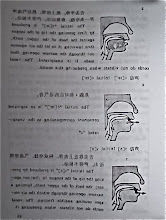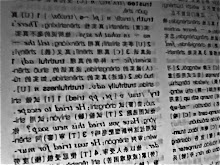

Latter-Day Eclogues, Elegies, & Etymologies
If we could account
for each raindrop,
for each hair on a lover's head,
for each scruple of dust, or
if we could account
for each scintilla of
blank noise and electric snow
adrift amid the empty
channels of our radios
and our televisions,
each pointed by their
very natures, as our
hearts and heads—
these, too, are made of
raindrops, static, dust,
and left-behind hairs—
antennae in each dimension
pointed towards the cosmic background;
in each dimension, but most
of all, in time.
Most of all, in time,
because if we could account
for these, then we must
count each second
before the heart gives out,
or the lungs; a slight twitch
unregistered in our ledgers,
not noted in our death certificates,
but registered somewhere
in blue stars, noted somehow
in the flight of birds
over red canyons;
and we must count, too,
each half-second,
each quarter, each eighth,
the subdivisions onward
towards the infinity
where the heart never
stops at all, still an infinitesimal
particle of life left behind in the lungs;
and count, too,
the second before the last,
minutes, millennia prior, and
light-years, pulled out backwards
through time as a loose thread
until we discover there is
but one thread, connected to itself
and connecting the infinities
where the edge of the universe
must be measured in the riotous haze
of a single electron, maybe the first
that tipped the scales of nothing to something.
If we account
for most of all time,
then so each final time,
each final transaction
between the eye and the world
as the eyelids, not heavy
with sleep but heavy
from life, narrow sight
to a thin sliver,
the last bar of light
between the curtains or
between the blinds
receding into an impression
of light behind the lids,
pulled over the eyes as the blanket
tucks in our chests,
and the last light
of our eyes, the thin membrane
to protect it, to seal it in
for as long as the light
can illuminate our dreams;
surely this is why
it is best to die
in our sleep,
not because of the morphine
of unconsciousness,
not because of the freedom
from pain,
but because of the thin sliver
of possibility
that we might go
in the middle of a dream,
to wander immortal
as an eye between the worlds,
seeing the beyond
that was our life
as the outlines of buildings
shrouded in mist after rain,
as silhouettes that shuffle
behind closed curtains at night;
but then we could not account
for the gamble:
the silhouette, your lover
leaving behind new hairs,
the city, hell.
To risk heaven,
if the light burns through
the mist, radiant towers;
or the silhouette, your
lover, radiant breast
and hips, in waiting, as if able
to see through to you
from the world
on the other side of the eye.
Best, then, to die
in the midst of life,
for to account
for each raindrop,
for each hair on a lover's head,
for each scruple of dust, or
each mote of static
would be to count to
infinity, stuck eternal
in the subdivisions
trying to stave off
the inevitable last twitch
of the heart, knowing not when
but knowing that it will come,
so preoccupied with the accounts
that for each raindrop
we miss the
hush of the rain.
John K., 9/20/2009
Could it be this time of night,
when from the kitchen window
the edges of the trees fall into the sky,
the air condenses into wood,
leaves evaporate.
Not 4AM, believable in its abject
stillness, around which dreams are spun,
stillness even of the crickets, and the last light
of the moon reflected off the eyes of the invisible
predators, off the vanishing wings of moths.
Not even of midnight, still sticky in its residues, ruffled
with agitations of the in-between, tossings, turnings,
working-outs of the wrinkles of work clothes and skins.
This time of night, it could be 9PM, when the world starts
closing in on us sooner this time of year. Housework.
Tidy up the frays with washings of
water glasses, and the knives that carve out
tomorrow in leftovers, yesterdays reheated;
the coffee ground, counters wiped,
the matching of socks, the laying-outs of
blouses and uniforms and button-downs,
weather forecasts: these are preparations,
libations for ghosts. Our own. Prayers, really,
because of the certainty that tomorrow
can go on without us, will go on, if. Our hearts:
choking up, choking down, choking on all
that occupies them, the ever-expanding pericardium
to accommodate ourselves, tailored to ill-
fit our beautiful bodies, stopped for a moment
at this time of night before the kitchen window,
where outside hover golden rectangles, the outlines
of buildings without which it would be too unbearable to
see the trees. The trees, unnameable in the dark;
we thought they strain to reach the sky, to pull
themselves out of the ground and become
of the air, of the wind; to lift the burden
of the lightness of birds on their branches
heavy with envy. No, it is the trees hungry
for the sky, for the wind, for this time of night.
To pull it into themselves, breathe in its particles
as they suck up the rain, so expansive their appetite
that the surfeit films their green. Hungry for
to swell, broaden, to take in more as our
occupied hearts, to hold eternal
that which it cannot possess—certainty
that tomorrow will go on with us,
that housework is no entropy,
that our weather forecasts can approximate
against the asymptote of September, 9PM—
that, could it be, this time of night,
we can be like moons to eclipse the sun,
like buildings to eclipse the stars,
and trees to eclipse the sky as a canopy
under which we can all sleep, assured
of our waking in the morning.
John K., 9/14 & 9/15/2009


We are in a garden, at night.
Corollas heavy with condensed
moonlight. Maybe each is a moon,
and that seems as natural as
the statues here. They are missing heads,
arms. Naked torsos, breasts and thighs
perfumed with hyacinth.
Their feet grafted into the soil, and
below the whorl of bats we can just make out
statues that have fallen over. Hands are appearing
out of the shoulders, eyes starting to grow
from the neck. We now see by the light of the corollas
they are statues of us, the hands, the eyes are ours,
emerging from stone which has emerged
from the soil. The eyes reaching, the hands seeing
past this garden—a shimmering line,
symbols improbable but just as natural
as anything else: lines, light—
where the horizontal afterglow of a twilight
caught in its own regression, and it begins
to make sense, now, surely as infinity.
It begins to make sense of infinity. We are not
oblivious, because we can pretend
not to see these buildings at our backs.
We thought they were painted black, but that is
just the night. We thought we could even see
them if we turned around fast enough. No.
Only the fallen statues of us. And the dread
that maybe we are the buildings, too.
A city of bodies, built out of bodies, great towers
of flesh, that disappear each time we try
to see them. Left only with the afterimage,
which, of course, are ghosts. As real
as a line, as light, as real as the hyacinths
even though we can't see them, because they are
moons. And why shouldn't they be,
because there is death and
death is a body.
Not a symbol of death, but
death—the line shooting outwards at both ends
to infinity; and light, carrying with it time
outwards to make the edges of everything.
We are lucky to be statues, buildings, and
it is miracle to be at all.
This is when we fall over, and hands, eyes
emerging from the torsos, in which
there is a heart, truly beating.
We are lucky, for the bats whorl over our heads
in this garden, at night.
John K., 9/3/2009, 10:47-11:33PM



